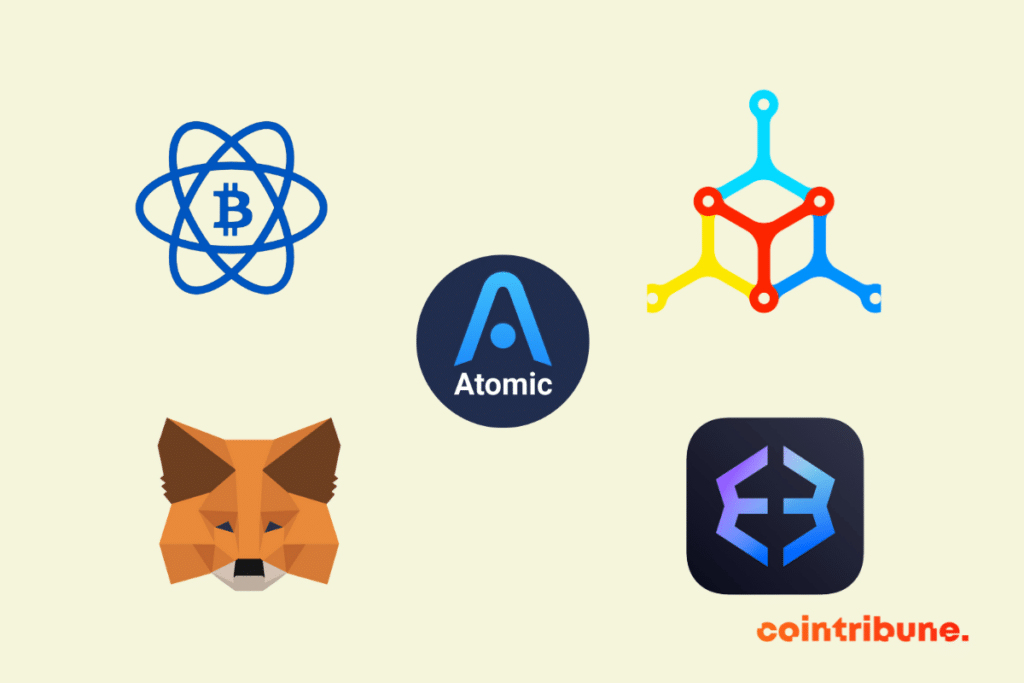Soft Wallet Bitcoin: What Is It?
Since they emerged, cryptocurrencies have revolutionized the world of finance by offering a decentralized alternative to traditional financial systems. If you are new to the crypto space and are not yet familiar with the specifics and concepts, including Bitcoin soft wallets, this is an opportunity to learn a bit more. A Bitcoin soft wallet is, indeed, a bitcoin wallet software that stores your private keys and allows you to send, receive, and store bitcoins. It contrasts with a hard wallet, which is often a physical device. Learn more about the concept of a Bitcoin soft wallet, an essential tool for anyone interested in cryptocurrencies and blockchain. What is a soft wallet, how does it work, and what are the advantages and disadvantages of using this type of wallet?

Definition of the Bitcoin Soft Wallet
In this section, we will examine the characteristics of soft wallets and compare them to hard wallets, as well as the different types of Soft Wallets available in the crypto market.
What is a soft wallet?
A soft wallet, also known as software wallet or hot wallet, is a program or application that allows crypto users to store and manage their crypto-assets such as bitcoin, ethereum, and other cryptocurrencies.
It is a digital solution that uses cryptographic algorithms to secure users’ funds and transactions. Reviews on bitcoin soft wallets are generally positive. Users appreciate their ease of use and accessibility, especially the ability to quickly make transactions from anywhere in the world.
Comparison between soft and hard wallet
The main difference between a soft wallet and a hardware wallet lies in how the private keys and funds are stored.
A soft wallet stores private keys on a device connected to the Internet, while a hard wallet, also known as a hardware wallet or cold wallet, stores private keys offline on a physical device such as the Ledger Nano or Trezor One. Here is a summary table highlighting the similarities and differences between software wallets and hardware wallets:
| Features | Software Wallet (Soft Wallet) | Hardware Wallet (Hard Wallet) |
| Private key security | Private keys stored online | Private keys stored offline |
| Access to funds | Quick and easy access to funds | Requires physical connection to access funds |
| Cost | Generally free | High initial cost for wallet purchase |
| Security level | Relatively less secure than hardware wallets | Considered the most secure wallet due to the lack of Internet connection |
| Use | Suitable for users making regular transactions | Suitable for users looking to store cryptocurrencies long-term and minimize hacking risks |
| Compatibility | Supported by most exchange platforms and wallets | May require special compatibility for certain exchanges and wallets |
Both hard wallets and soft wallets have their disadvantages and advantages. For regular cryptocurrency users, soft wallets are more convenient, but for storing large amounts of digital currencies long-term, it is advisable to turn to a hardware wallet.
Types of Soft Wallets
There are several types of Soft Wallets, including:
- Desktop wallets: applications installed on a computer, generally offering better security than other types of Soft Wallets. Your cryptos are stored on the hard drive of your computer. This already represents a good level of security. These wallets are recommended for trading individuals as they simplify various transactions,
- Mobile wallets: apps for smartphones and tablets, are easily accessible and allow transactions on the go. Very common, they are recommended for users who want to make daily transactions or store a small amount of cryptos. One of the many advantages of this wallet is the QR code payment, which ensures quick and easy transactions,
- Online wallets: services accessible via a web browser, which store private keys on third-party servers. Also called internet wallets, they are efficient for people who do not want to be trapped on a single device. However, one must be very cautious with these wallets as hacking attempts are numerous,
- Paper wallets: physical representations of private and public keys in the form of QR codes or strings of characters. They must be scanned or manually entered to make transactions. Less common due to technical difficulties and lack of versatility, these wallets were presented as the most secure,
How a Bitcoin soft wallet works
Numerous underlying mechanisms allow a Bitcoin soft wallet to function. These include the creation and management of private keys, sending and receiving transactions, and the security and encryption measures put in place to protect users’ funds.
Creation and management of private keys
A soft wallet generates a key pair, consisting of a private key and a public key. The private key is used to sign transactions and must be kept secret, while the public key is used to receive funds and can be shared freely.
The private key is stored securely and encrypted on the user’s device, thus protecting the funds from unauthorized access.
Sending and receiving transactions
To send bitcoins, ethereum, or other cryptocurrencies from a soft wallet, the user must provide the recipient’s address and the amount to send. The soft wallet then signs the transaction with the user’s private key before broadcasting it to the blockchain for validation and confirmation. To receive funds, the user simply shares their public address (or a corresponding QR code) with the sender.
Security and encryption
Soft wallets use various security and encryption methods to protect private keys and sensitive user data. These methods may include two-factor authentication (2FA), complex passwords, and encryption of data stored on the user’s device. However, soft wallets are not as secure as hard wallets, as they are more exposed to Internet-related risks such as malware and phishing attacks.
Advantages and disadvantages of soft wallets
Like any technological solution, soft wallets have both advantages and disadvantages. Therefore, it is important to examine the main positive and negative points associated with the use of soft wallets for managing crypto-assets.
The advantages
The main advantages of soft wallets include:
- Ease of use: Soft wallets are generally simpler to use than hard wallets, as they do not require specific hardware and can be used on common devices such as computers and smartphones,
- Accessibility: Soft wallets allow for quick and easy access to the user’s funds, wherever they are and at any time, as long as they have an Internet connection,
- Low cost: Soft wallets are generally less expensive than hard wallets, as they do not require investment in dedicated hardware. Many soft wallets are available for free or at a low cost.
The disadvantages
The main disadvantages of soft wallets are:
- Relative security: Although soft wallets offer a certain level of security through encryption and other measures, they are generally less secure than hard wallets because they are more vulnerable to online attacks and malware.
- Phishing and hacking risks: Soft wallet users are more exposed to phishing attacks and hacking attempts because their private keys and data are stored on Internet-connected devices.
- Dependency on a third party: Some types of soft wallets, such as online wallets, require the user to trust a third-party provider to store and manage their private keys, which can introduce additional risks in case of failure or malice from the provider.

How to choose a soft wallet suitable for your needs?
The choice of a soft wallet suitable for your needs depends on several factors, such as your goals regarding crypto-asset management, the features you need, and the reputation of the soft wallet provider. Therefore, it is imperative to know the steps to follow to choose the hot wallet that suits you best.
Assessment of your needs
Before choosing a soft wallet, it is important to assess your needs regarding crypto-asset management. Ask yourself questions such as:
- What type of cryptocurrencies do you want to store?
- Do you need to access your funds frequently or do you prefer long-term storage?
- What level of security are you willing to accept?
Comparison of features
Examine the features offered by the various soft wallets available in the market. Some wallets may offer additional features such as support for multiple cryptocurrencies, integration with exchange platforms, or advanced backup and recovery options.
Reputation and reviews
It is important to consider the reputation of the soft wallet provider and the reviews from other users. Look for online reviews, blog articles, and forum discussions to get an idea of the quality and reliability of the soft wallet you are considering using, as it concerns the security of your assets.

The popular soft wallets
There are many popular hot wallets on the market, each offering different features and levels of security. Discover some recommended soft wallets to give you an idea of the available options.
Frequently Recommended Soft Wallets
Among the many soft wallets available in the crypto market, some stand out and are recommended by users. These include:
- Electrum: An open-source desktop soft wallet popular for storing and managing bitcoins, ethereum, and others, with advanced features such as support for multisig transactions and connectivity with hard wallets,
- Exodus : A multicryptocurrency soft wallet offering an intuitive user interface and support for many popular cryptocurrencies, including bitcoin, ethereum, and litecoin,
- Trust Wallet : A mobile soft wallet that supports many cryptocurrencies and tokens, as well as integration with decentralized exchange (DEX) platforms to facilitate transactions,
- MyEtherWallet : An online soft wallet focused on ethereum and ERC-20 tokens, offering advanced features such as connectivity with hard wallets and access to decentralized services (dApps),
- MetaMask: A browser extension that acts as a soft wallet for ethereum and ERC-20 tokens, facilitating access to decentralized services and allowing users to interact with blockchain applications.
In addition to these soft wallets, there are several others like Coinbase Wallet, Blockchain Wallet, Coinomi, Binance Chain Wallet, Infinito Wallet, Lumi Wallet, etc. The choice is yours according to your status and needs.
Brief comparison of Soft Wallets
All of the soft wallets mentioned above offer unique features and benefits. For example, Electrum is known for its security and advanced features, while Exodus offers an attractive user interface and supports many cryptos.
Trust Wallet and MyEtherWallet stand out for their integration with decentralized exchange platforms and decentralized services, while MetaMask facilitates access to blockchain applications from a web browser.
It is important to note that the list above is not exhaustive and that there are many other hot wallets available on the market. Each user must choose the soft wallet that best meets their needs for crypto-asset management, considering the features, security, and reputation of the provider.
Do not forget that the security of your crypto-assets largely depends on your practices and vigilance in managing your private keys and passwords. Whatever soft wallet you choose, make sure to implement appropriate security measures, such as regularly backing up your private keys, using strong passwords, and enabling two-factor authentication (2FA) whenever possible.
Ultimately, choosing a soft wallet suitable for your needs is a crucial step to ensure the security and ease of access to your funds in bitcoin and other cryptocurrencies. By considering the advantages and disadvantages of each option, as well as your own needs and preferences, you will be able to make an informed decision and fully enjoy the benefits offered by the world of crypto-assets.
Conclusion
In conclusion, Bitcoin soft wallets are digital tools that allow users to manage and secure their crypto-assets, such as bitcoin and other cryptocurrencies. Although they offer ease of use and increased accessibility compared to hard wallets, they also present disadvantages in terms of security and risks associated with the internet. Choosing the right soft wallet depends on the individual needs of each user, their security preferences, and the features sought. To make an informed decision, it is essential to compare the different options available, assess their features, and consider the reputation of the provider.
Maximize your Cointribune experience with our "Read to Earn" program! For every article you read, earn points and access exclusive rewards. Sign up now and start earning benefits.
The Cointribune editorial team unites its voices to address topics related to cryptocurrencies, investment, the metaverse, and NFTs, while striving to answer your questions as best as possible.
The views, thoughts, and opinions expressed in this article belong solely to the author, and should not be taken as investment advice. Do your own research before taking any investment decisions.